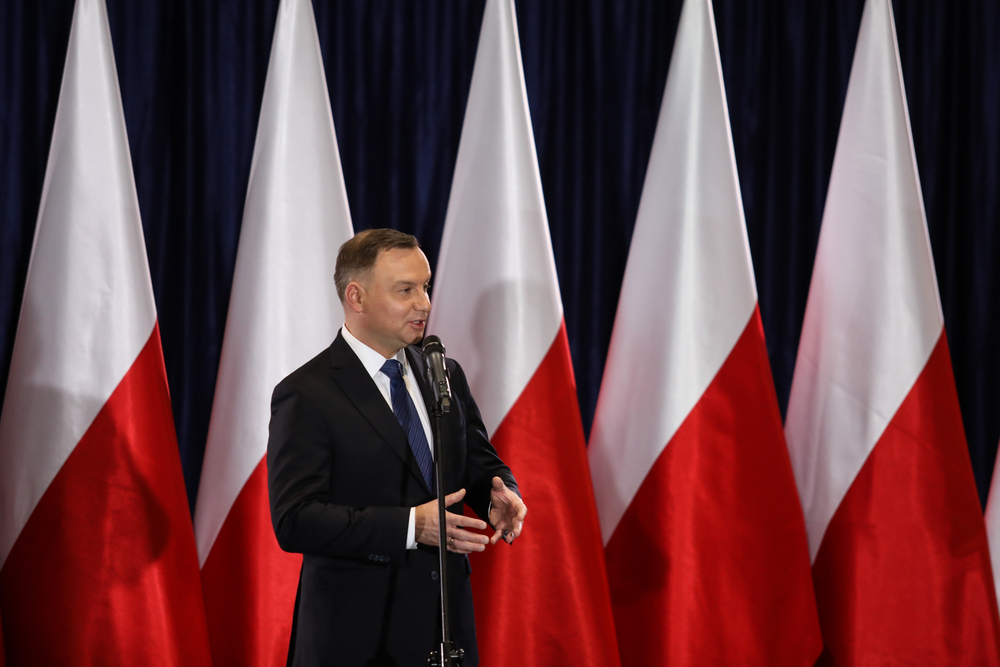In late December, Polish President Andrzej Duda vetoed a controversial media bill that would tighten the rules around foreign ownership of media in the country, in a move press freedom watchdogs welcomed an important victory for media pluralism and independence.
Critics had warned that the bill, adopted by Poland’s parliament on December 17, aimed to force the sale of U.S-owned news channel TVN24, which is critical of the government, and was the latest example of pressure on independent media in Poland.
In the lead up to the decision, seventeen international media freedom and journalists’ groups wrote to President Duda urging him to apply the presidential veto to the so-called “Lex-TVN” amendment, arguing it posed a fundamental threat to media freedom in Poland.
In a televised statement on 27 December, Duda announced “I am vetoing it”, raising concerns about business arrangements and investment treaties with the United States, as well as concerns about freedom of speech.
In a statement, TVN’s parent company Discovery said: “We commend the president for doing the right thing and standing up for core democratic values of a free press and the rule of law, and we want to thank all the viewers and everyone that has supported this important issue”
TVN’s board of directors welcomed the announcement “with appreciation and joy”, saying the president had “stood up for good relations with the US”. Blix Aliu, the U.S. chargé d’affaires in Warsaw, also thanked Duda for “protecting the investment climate in Poland” in a tweet on the day of the veto.
EU Commission vice-president for values and transparency, Věra Jourová, welcomed Duda’s veto, tweeting: “Good news from Poland. I welcome the announcement by President Duda that he vetoes Lex TVN. This is an important signal for dialogue”.
To override the veto, PiS would now need a three-thirds majority in the Sejm, with at least half of lawmakers present, far more than its current majority. This means that Duda’s veto is unlikely to be overridden.
Although the veto thwarted PiS’s plans to tighten the rules around foreign media ownership, it spared Poland from an outright conflict with the United States, one of Warsaw’s key allies, which could have economic and military repercussions for Poland.
#Poland: In important victory for #mediafreedom, President @AndrzejDuda has today vetoed the controversial #lexTVN bill on foreign media ownership, dealing a serious blow to PiS’ efforts to force the sale of critical U.S-owned broadcaster #TVN. IPI welcomes Mr. Duda’s decision. pic.twitter.com/MXYXViAKXj
— IPI-The Global Network for Independent Journalism (@globalfreemedia) December 27, 2021
TVN24 in the crosshairs
The lex-TVN bill, initially submitted to parliament by PiS lawmakers on July 7, proposed to bar companies which are majority-owned by entities from outside the European Economic Area (EEA) from owning more than a more than 49 per cent stake in Polish media.
Like its parent company TVN, TVN24 has been 100 percent owned by U.S.-based Discovery, Inc. since 2015. It is owned via a subsidiary, Polish Television Holding BV, registered in the Netherlands, an EU member state, which enables it to get around an existing ban on non-European companies owning more than 49 percent of Polish media companies.
TVN24 is a leading news channel in Poland, offering viewers an alternative to the coverage broadcast by public television broadcaster TVP, which was taken over by the ruling Law and Justice party shortly after winning the elections in 2015. Fakty, the evening news program broadcast on the TVN and TVN24 BiS news channels, is the most-watched news program in Poland.
Although the bill was approved by the Sejm, the lower chamber of parliament, in August, it was rejected by the Senate, the upper chamber, which is controlled by the opposition. However, in December, the Sejm unexpectedly voted to override the Senate’s veto. Lawmakers had not been scheduled to vote on the bill, but it ended up on the Sejm agenda after a committee convened at short notice to discuss the issue.
Had the bill become law, Discovery would have been forced to sell its majority stake in TVN to comply with the new regulations. Duda’s veto did not come out of the blue: he had expressed reservations about the bill earlier, saying that taking over media owned by foreign companies should be carried out on market terms, rather than via compulsory solutions.
Good news from Poland.
I welcome the announcement by President Duda that he vetos #LexTVN.
This is an important signal for dialogue #mediafreedom.— Věra Jourová (@VeraJourova) December 27, 2021
Plans for ‘repolonization’
The bill was part of a longer-term push towards the “repolonization” of the media by the PiS-led ruling camp, which involves reducing foreign ownership of media companies in Poland. Some politicians in the ruling camp have long claimed that foreign-owned media outlets, especially German-owned ones, are deliberately critical of the current government.
An earlier victim of “repolonization” was one of the country’s largest media companies, Polska Press, which was acquired from German company Verlagssgruppe Passau by state-controlled oil refiner and petrol retailer PKN Orlen. This resulted in a purge of editorial management at regional newspapers it owns this year.
PiS itself has claimed that the foreign ownership bill aims to stop countries outside the EEA, such as Russia and China, from gaining influence over the Polish media. However, opposition politicians warned that it is an attack on the independent media. After the bill was adopted, thousands of people protested in Warsaw and other cities in favour of media freedom.
The bill was previously criticized by the European Commission. “Once this bill becomes a law, the Commission will not hesitate to take action in case of non-compliance with EU law,” Commission Vice President Věra Jourová said in a statement on December 17.
Following the veto, PiS spokeswoman Anita Czerwińska, told the state news agency PAP that the ruling party was “disappointed” by Duda’s decision.




